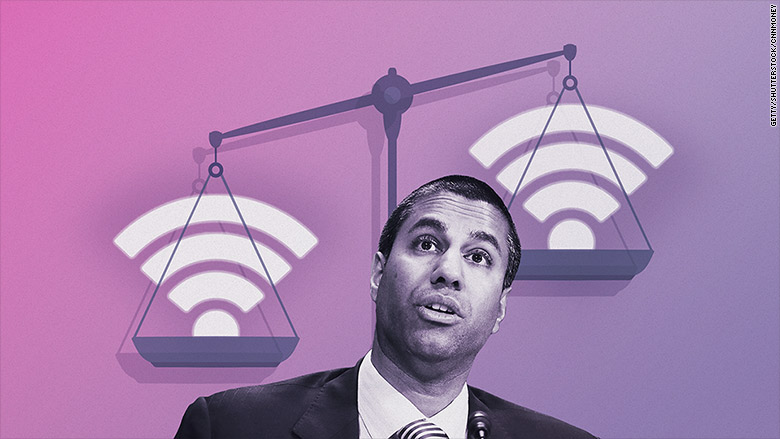Net Neutrality Under Fire
March 23, 2017
In March of 2016 a major debate ignited in federal courts over the idea of open access to the internet through services providers, without blocking or intentionally slowing or speeding up connection to certain businesses or companies that pay for premium services. Companies such as Charter Communications and Comcast have been known to actively violate this upholding from the Federal Communications Bureau.
If we take Youtube and Netflix into a hypothetical scenario: an internet service provider will approach both companies and ask them to pay connection dues to keep their services available to customers of that provider, and if Netflix refuses, the provider could essentially slow down the speed that their users have to the Netflix service and essentially block it. This same thing can be applied to news, political websites, or other companies. There is no guarantee that this will be used as a political silencing tool, but it opens up the possibilities to it being used as such under the guise of premium service.
Popular sights such as Reddit, Forbes, and other forums took arms against the threat to net neutrality by showing their outrage and communicating with local officials and congressmen to support net neutrality. On June 14th of last year, the protesting and backlash was loud enough to garner the Supreme Court and President Obama handing down judgements on it; upholding net neutrality.
It was a victory for those who campaigned. The men and women who rallied to the cause to open an accessible internet could rest their heads knowing that companies could no longer have the power of influence to control what they view. However, this victory was short lived.
Ever since the Trump administration came into office in January of this year, they appointed one of the former commissioners of the FCC, Ajit Pai, to be the head director. The appointment and support for Pai has been small and flew mostly under the media’s radar.
On February 4th, Pai released a statement saying that “Net Neutrality was a mistake.” He had reportedly made plans and initiatives to get rid of the Obama era rules on freedom of the internet, and favor large internet service providers, citing his reasons being that net neutrality ends up creating less jobs and puts more stress on businesses; going as far as dodging questions if he and the FCC will even enforce current regulations. Even with statistical evidence from big media giants such as Google or Facebook in association with internet providers announcing that it expands opportunity and creates innovation when the net is allowed to be accessed without restrictions on it. With information presented like this, the question has to be asked if the current FCC and congressional members are concerned with data and facts rather than shareholder value. This makes it even more worrisome that the leader of a federal trade commision will enforce laws and values that he’s been selected to dutifully uphold even if he disagrees with them. Pai went further on record to say, “I don’t want to wade into larger political debates,” when it was shown that he’ll challenge the opposite side of the aisle in both the house, senate and courts.
We here at the Johnny Green like to provide evidence and facts at face-value. While most of the staff on hand will agree and defend net neutrality, we like to try or at least attempt to provide unbiased news when we report on it, and strongly indicate if an article is hard news or opinionated and support their views with case studies and evidence, which seems to become harder and harder for certain news and entertainment outlets today. When interviewing the staff of the Johnny Green, the school district, and the students, a multitude of different responses was given.
When asking the more liberal members of the staff, such as Mr. Franco said, “The internet needs to be open and accessible, where some should be able to freely explore and express themselves — on either side of the aisle or spectrum; without having the repercussion or fear of censorship from different outlets.“ Or Ben Germinara, Greg Reeves, and Connor VanEpps saying collectively, “Net neutrality should remain how it is, changing it would hinder our ability of freedom of speech and would violate constitutionality and freedom of expression.” They then go onto to further say that the internet should be a natural right to be guaranteed in the 21st century, similar to the Nordic models.
Even more conservative and middle ground viewpoints from Jared Sullivan, David Coyle, and Mr. Smith, even made pro net-neutrality statements. Sullivan went on record to say, “Any regulation, be it government or companies, shouldn’t harm or regulate the internet. The internet is a source and a tool that anyone should use, and is one of the greatest things that we’ve created; even as a supporter of companies and business… net neutrality needs to be upheld.”
The only person I can find against Net Neutrality was Jon Wejko, going on to say, “Large companies that own the ability to stream and sell out slots of T.V time or internet services, should have every right to do whatever they desire to it, business isn’t about freedom, it’s about profit. Business should be void of ethics and morality, and that’s why business succeeds.”
Out of the numerous other people that were interviewed, Wejko seems to be the only one that shared that opinion out of the 20 or so people that were spoken with. Wejko seems to have the mindset of the current administration, but according to the Washington Post from 2014 when the issue was becoming more and more known: 81% support Net Neutrality, 17% oppose it, and 3% don’t know/have no opinion on the matter.
Either way, no matter the party or the political affiliation you have, future concern and debate over this issue will continue.
